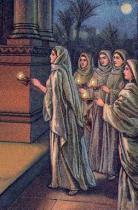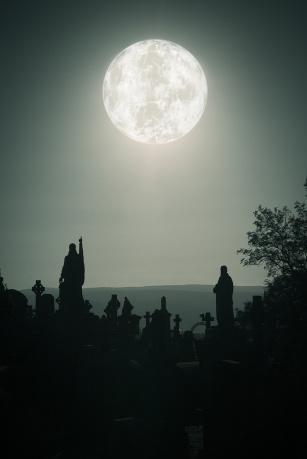Like any group of people large enough to have its own “culture,” Christians are a strange bunch. And, also like any large enough group of people, outsiders have looked in through the (in this case ‘stained glass’) window to find a confusing mish-mash of beliefs and practices that, without explanation, can appear very bizarre. It’s why Christians were once widely thought to be incestuous cannibals (“Holy Kiss” + “Eucharist” = “…What?”).
But even as a guy on the inside, there are still things about my Christian brothers and sisters that I do not understand – especially when it comes to the fads that run through the pews. Just off the top of my head, here are four recent pop-culture-y things that I’ve had Christians excitedly talk to me about, only to leave me confused:
1. Thomas Kinkade paintings
Yes, Kinkade was a Christian. That does not make him a good artist (nor does his ability to market mass-produced, grossly over-priced pieces of kitsch).
2. The Twilight Series
I don’t really care that Stephanie Meyer was able to turn supernatural teen angst into a money machine while promoting the value of “saving sex until marriage.” You don’t need 2500+ pages of tedious, rehashed tropes to get that message across. (And you can’t even play the “at least she’s a Christian” card on this one.)
3. The fact that Matthew McConaughey mentioned “God” in his Oscars speech
Yes, I suppose it’s cool that God got a shout-out in front of millions of people, but given his description of God that immediately followed, all that McConaughey’s comment did was remind me of this:
(Note: It may very well be the case that McConaughey is feeling tugged in a God-ward direction – I pray that he is. In what might be the first celebrity tabloid photo I’ve ever cared about, the actor was seen reading Lee Strobel’s excellent book The Case for Christ while working out. I hope that McConaughey will get another opportunity to share more specifically about what he’s learning and talk less about how “God is a friend and that friend is you”.)
4. Astrology
This one’s tricky, because it usually goes by another name: watching for the “signs of the times.” Citing several biblical admonitions to “watch” and “be ready” for the return of Christ, the latest iteration of excitement in this direction seems to center around a most ominous-sounding cosmological entity: blood moons.

Thanks to authors and pastors like Mark Biltz and John Hagee, several upcoming lunar eclipses have worked some Christians up into the latest frenzy over an apparently imminent return of Christ. In brief, in 2014 and 2015, Earth will see four total lunar eclipses (when the Earth comes directly between the sun and the moon) that will cause the moon to appear reddish, much in the same way that the sun appears reddish at sunrise and sunset. Moreover, each of these eclipses (or “blood moons”) will fall on a Jewish holiday, such as Passover or Sukkot. According to the theory, this kind of quartet of eclipses (or “Tetrad”) has allegedly heralded portentous events in Israel’s history, so…something might happen soon. The fun really begins when prophecies like Joel 2:31 and Acts 2:20 are brought into play. Typically, folks stop short of actually claiming that “Christ is absolutely going to return” on this or that date, but these conversations and websites are liberally peppered with the word “Rapture” and all of the eschatological implications that it carries.
It’s kind of similar to how I might tell you all about how your girlfriend is a stressful, manipulative, witch who sucks the life out of everyone around her; if I never actually say the phrase “I think you should break up with her,” that’s only because my meaning is already obvious. Even if the proponents of this theory are not as explicit in their “date-setting” for Christ’s return as someone like Harold Camping or Hal Lindsey (or Jerry Falwell or Jack Van Impe…we’ve had a lot of brothers and sisters play in this sandbox), the undertone to this fascination with blood moons is fundamentally no different.
I’ll spare you the breakdown of why the upcoming tetrad is neither unusual nor impressive (an excellent explanation can be found here), but it essentially boils down to three facts:
1) When a culture bases its holidays on a lunar calendar (like the Hebrews did), and places those holidays mid-way through the month, then those holidays will regularly coincide with eclipses.
2) As is usually the case (thanks to how the angles and sight-lines of eclipses work), almost no one in the world will be able to naturally see all of these blood moons from a single geographical location – not even from Jerusalem.
3) There have been several “blood-moon tetrads” where nothing of note has happened in Israel. In fact, the last two were in 1986-87 and 1995-96.
Biltz and Hagee are just the latest in a long line of Christians who have over-emphasized some details from Scripture at the expense of others. But this sudden fascination with cosmological omens should not only be rejected because it is particularly based more in astrology (or “the study of the movements and relative positions of celestial bodies interpreted as having an influence on human affairs and the natural world”) than the Bible; theologically speaking, Christians should reject this entire approach to anticipating the Parousia – if we’re to follow Christ’s instructions, at least.
It is absolutely true that Christians should eagerly anticipate the return of Jesus promised in Acts 1 and previewed in Revelation 19; Jesus Himself made a clear promise to that happy day in John 14:3. And, yes, Jesus certainly instructed His followers to pay attention and prepare for His return (much of the Olivet Discourse in Matthew 24, Mark 13, and Luke 21 is about this). But that does not mean that we should be blown about by every wind of doctrine that Christians spin up on the matter. It does not mean that we must sip our eschatology simultaneously with our geo-politics. And it does not mean that we should constantly be looking to divine when that Day is going to arrive.
We await Christ, not a calendar date.
The important thing – the thing that Christ was consistently calling his disciples to “watch” for – is our own behavior and sincerity in patterning our lives after His. Our first question should not be “Which day will be the one on which Christ shall come back?,” but rather, “What shall I be doing when Jesus actually does return?”

Think of what the Ten Virgins are doing in the parable found in Matthew 25: 1-13. They are diligent in their duties to stay awake and anticipate the return of their grooms, whenever that may happen; they are not consulting the seers, the stars, or even the Scriptures to predict when those grooms should return. Or the very next story – the famous Parable of the Talents in Matthew 25:14-30 – sees workers expected to live appropriately while the Master is away; we don’t know when, but the Master might return at any point and check on our work – will we be ready? The Date is unimportant; the Groom is all that matters; the virtuous Virgins who faithfully “keep watch” (read: actively wait) are is the point; the servant who does the work of the Kingdom is the one called “good and faithful” when the Master returns.
The Apostle Paul explicitly pointed out that the primary focus of the Christian mind should not be on the signs themselves (whatever they may be), but on the Christ that the eventual signs will point to. Remember I Corinthians 1:22-24:
“For Jews demand signs and Greeks seek wisdom, but we preach Christ crucified, a stumbling block to Jews and folly to Gentiles, but to those who are called, both Jews and Greeks, Christ the power of God and the wisdom of God.” (ESV)
When we Christians get too worked up over apparent astrological coincidences – or whatever else the next sign-fad will be – we distract ourselves from the far more edifying pursuit of Christ Himself.

The Blood-Moon-Rapture-Israel-2014-2015-Lunar-EclipseExtravaganza is not the first craze to sweep through some sectors of Christianity about an impending end of the world. It almost certainly will not be the last. However, we should – as always – keep our eyes, our minds, and our hearts eagerly fixed on the actual prize, not simply the satisfaction of figuring out a puzzle that may or may not be there to solve at all.
For, as Paul wrote in his letter to Titus:
The grace of God has appeared, bringing salvation for all people, training us to renounce ungodliness and worldly passions, and to live self-controlled, upright, and godly lives in the present age, waiting for our blessed hope, the appearing of the glory of our great God and Savior Jesus Christ, who gave himself for us to redeem us from all lawlessness and to purify for himself a people for his own possession who are zealous for good works. (Titus 2:11-14, ESV)
The Christian message has everything to do with this, not amateur astronomy-turned-astrology. I’m far more convinced that my linking to an “Answers in Genesis” article is a sign of the Apocalypse than anything I’ve yet to read about the moon.
“Blood Moon” photo credit: abdallahh via photopincc
“Moon” photo credit: Jesus Belzunce via photopin cc
